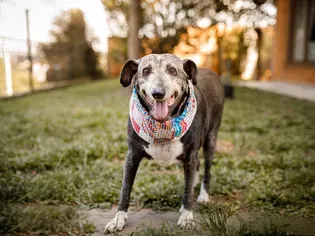10 Tips for Taking Care of a Senior Dog
Updated on 04/26/24

10 Essential Tips for Providing Comfort and Care to Your Senior Dog
With age comes wisdom, experience, and a special bond that deepens between you and your beloved canine companion. As your dog enters its golden years, it's essential to adapt your care routine to meet their changing needs. Here are 10 comprehensive tips to help you ensure your senior dog lives a long, happy, and healthy life:
1. Provide a Comfortable Bed and Ample Rest:
As dogs age, they may experience joint pain and stiffness, making it crucial to provide a comfortable and supportive bed. Choose a bed with ample cushioning and consider adding a heated pad for extra warmth. Encourage regular rest periods to minimize joint strain and promote muscle recovery.
2. Adjust Diet and Nutrition:
The nutritional needs of senior dogs differ from those of younger dogs. Senior dogs often have reduced appetites and may benefit from smaller, more frequent meals. Consider switching to a diet specifically formulated for senior dogs, which often contains lower levels of calories and fat and higher levels of fiber and antioxidants.
3. Exercise Regularly:
Even though senior dogs may have decreased energy levels, regular exercise is still essential for their overall well-being. Choose low-impact activities such as gentle walks, swimming, or puzzle toys that stimulate their minds without straining their bodies.
4. Maintain Dental Hygiene:
Dental problems are common in senior dogs, as they are more prone to plaque buildup and gum disease. Regular teeth brushing and professional dental cleanings are essential for maintaining good oral health and preventing infections.
5. Monitor Weight and Body Condition:
Senior dogs are at risk for both weight gain and weight loss. Monitor your dog's weight regularly to ensure they are maintaining a healthy body condition. If you notice any significant changes, consult with your veterinarian.
6. Watch for Mobility Issues:
As dogs age, their joints and muscles may weaken, leading to mobility issues. Provide ramps or steps to assist them in getting around, and consider using assistive devices such as wheelchairs or slings if necessary.
7. Provide Mental Stimulation:
Senior dogs may experience cognitive decline, so it's essential to provide them with plenty of mental stimulation. Engage them in interactive games, teach them new tricks, or provide puzzle toys that challenge their minds.
8. Establish a Regular Health Checkup Schedule:
Senior dogs require more frequent veterinary checkups to monitor their health and detect any potential issues early. Schedule regular exams to ensure your dog is receiving the necessary care and preventive screenings.
9. Manage Pain and Discomfort:
Dogs may experience aches and pains as they age. Consult with your veterinarian about pain management options such as medication, supplements, or physical therapy to provide comfort and improve their quality of life.
10. Provide Love and Affection:
Your senior dog deserves all the love and attention you can give them. Spend quality time with them, provide plenty of cuddles, and let them know how much they are loved. Their bond with you will provide immeasurable comfort and joy during their golden years.
Examples:
* Comfortable Bed: Consider a dog bed with orthopedic support for added comfort.
* Dental Hygiene: Brush your dog's teeth at least once a day and schedule regular dental checkups.
* Weight Monitoring: Use a kitchen scale to track your dog's weight changes.
* Mobility Issues: Install non-slip ramps or carpet runners to improve traction and reduce the risk of falls.
* Mental Stimulation: Hide treats around the house for your dog to find, stimulating their sense of smell and cognitive abilities.
By following these tips, you can create a comfortable and fulfilling environment for your senior dog, ensuring they enjoy a healthy and happy life filled with love and companionship. Remember, your dog has been your loyal companion for years; now it's your turn to return the favor and provide them with the best care possible during their golden years.
Explore More Pets

Basic Training
Puppy and Baby Introductions

Working Dog Breeds
All About Search and Rescue Dogs

Dog Treatments
Puppy Vaginitis: Signs, Causes and Treatment

Dog Adoption
After More Than 1,200 Days in the Shelter, Coco Goes Home

Basic Training
How to Train Your Puppy to Go on Potty Pads

Hybrid Dog Breeds
The Difference Between a Mutt, Mixed Breed, or Designer Dog?

Dog Treatments
Nail Problems in Dogs

Puppies
7 Reasons Why Two Dogs Are Better Than One